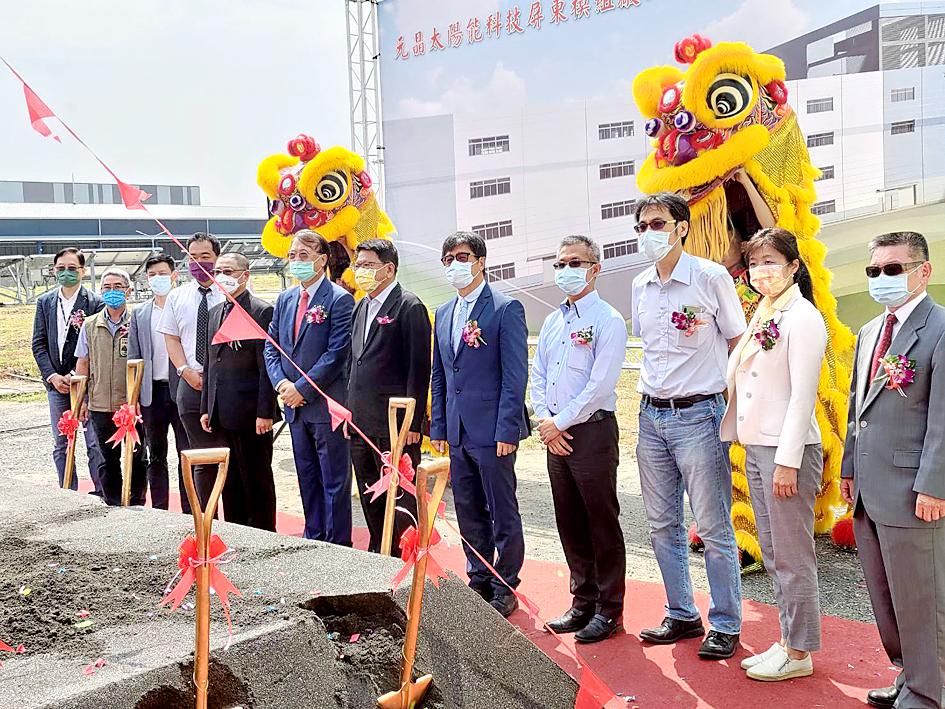TSEC Corp (元晶太陽能) yesterday said it is investing NT$1 billion (US$35.75 million) to expand large-sized solar module capacity and a logistic facility at its plant in Pingtung City in expectation of rising demand for clean energy next year.
The investment would bring TSEC’s annual solar module capacity to 1.5 gigawatts, a 50 percent increase from the current level, the company said in a statement.
The new production line would be completed in September next year and enter volume production in the fourth quarter of the same year, the firm said.

Photo courtesy of TSEC Corp
“Large solar cells and modules will help satisfy urgent demand from domestic solar power developers. The modules will also help improve land-use efficiency, as local solar power developers are facing challenges to secure land,” TSEC spokesman Henry Chiang (江郅豪) said.
TSEC earlier this year spent NT$750 million building a new production line in Hsinchu County’s Hukou Township (湖口) that would produce large and high-efficiency 525 watt and 700 watt solar cells, rather than the standard solar cells that are between 350 and 400 watts.
TSEC vice president for marketing William Liao (廖偉然) yesterday gave an optimistic outlook about solar demand, saying that cutting carbon emissions has become a major global focus this year, with the US and China targeting carbon neutrality by 2030 and 2060 respectively.
That will drive demand for solar power in China and the US, Liao said in a statement.
Taiwan has gained an advantage over its rivals and secured a bigger share of the US’ 20-gigawatt solar market, as the administration of US President Joe Biden has banned the use of solar products made in China’s Xinjiang region and curbed imports of solar products from Southeast Asian countries amid lawsuits over tariff evasion, he said.
In Taiwan, TSEC expects solar panel installation to soar 50 percent to 3 gigawatts next year, compared with 2 gigawatts this year, Liao said, adding that a surge in raw material costs would gradually ease next year.
Separately, silicon wafer supplier Sino-American Silicon Products Inc (中美晶) yesterday said that solar revenue jumped 23.44 percent month-on-month, or 97.37 percent annually, to NT$840 million last month.
That helped boost the firm’s consolidated revenue last month to NT$6.25 billion, up 7.34 percent from a month earlier, or up 12.2 percent from a year earlier.
In the third quarter, the company’s revenue inched up 1.97 percent sequentially, or 13.93 percent annually, to NT$17.52 billion.
Solar revenue grew 7.95 percent quarterly and 55.65 percent annually to NT$2.14 billion last quarter, the company said.
About 90 percent of the company’s revenue came from its silicon wafer manufacturing arm, GlobalWafers Co (環球晶圓), which posted NT$15.36 billion in revenue last quarter.

Taiwan’s long-term economic competitiveness will hinge not only on national champions like Taiwan Semiconductor Manufacturing Co. (TSMC, 台積電) but also on the widespread adoption of artificial intelligence (AI) and other emerging technologies, a US-based scholar has said. At a lecture in Taipei on Tuesday, Jeffrey Ding, assistant professor of political science at the George Washington University and author of "Technology and the Rise of Great Powers," argued that historical experience shows that general-purpose technologies (GPTs) — such as electricity, computers and now AI — shape long-term economic advantages through their diffusion across the broader economy. "What really matters is not who pioneers

In a high-security Shenzhen laboratory, Chinese scientists have built what Washington has spent years trying to prevent: a prototype of a machine capable of producing the cutting-edge semiconductor chips that power artificial intelligence (AI), smartphones and weapons central to Western military dominance, Reuters has learned. Completed early this year and undergoing testing, the prototype fills nearly an entire factory floor. It was built by a team of former engineers from Dutch semiconductor giant ASML who reverse-engineered the company’s extreme ultraviolet lithography (EUV) machines, according to two people with knowledge of the project. EUV machines sit at the heart of a technological Cold

TAIWAN VALUE CHAIN: Foxtron is to fully own Luxgen following the transaction and it plans to launch a new electric model, the Foxtron Bria, in Taiwan next year Yulon Motor Co (裕隆汽車) yesterday said that its board of directors approved the disposal of its electric vehicle (EV) unit, Luxgen Motor Co (納智捷汽車), to Foxtron Vehicle Technologies Co (鴻華先進) for NT$787.6 million (US$24.98 million). Foxtron, a half-half joint venture between Yulon affiliate Hua-Chuang Automobile Information Technical Center Co (華創車電) and Hon Hai Precision Industry Co (鴻海精密), expects to wrap up the deal in the first quarter of next year. Foxtron would fully own Luxgen following the transaction, including five car distributing companies, outlets and all employees. The deal is subject to the approval of the Fair Trade Commission, Foxtron said. “Foxtron will be

BUBBLE? Only a handful of companies are seeing rapid revenue growth and higher valuations, and it is not enough to call the AI trend a transformation, an analyst said Artificial intelligence (AI) is entering a more challenging phase next year as companies move beyond experimentation and begin demanding clear financial returns from a technology that has delivered big gains to only a small group of early adopters, PricewaterhouseCoopers (PwC) Taiwan said yesterday. Most organizations have been able to justify AI investments through cost recovery or modest efficiency gains, but few have achieved meaningful revenue growth or long-term competitive advantage, the consultancy said in its 2026 AI Business Predictions report. This growing performance gap is forcing executives to reconsider how AI is deployed across their organizations, it said. “Many companies